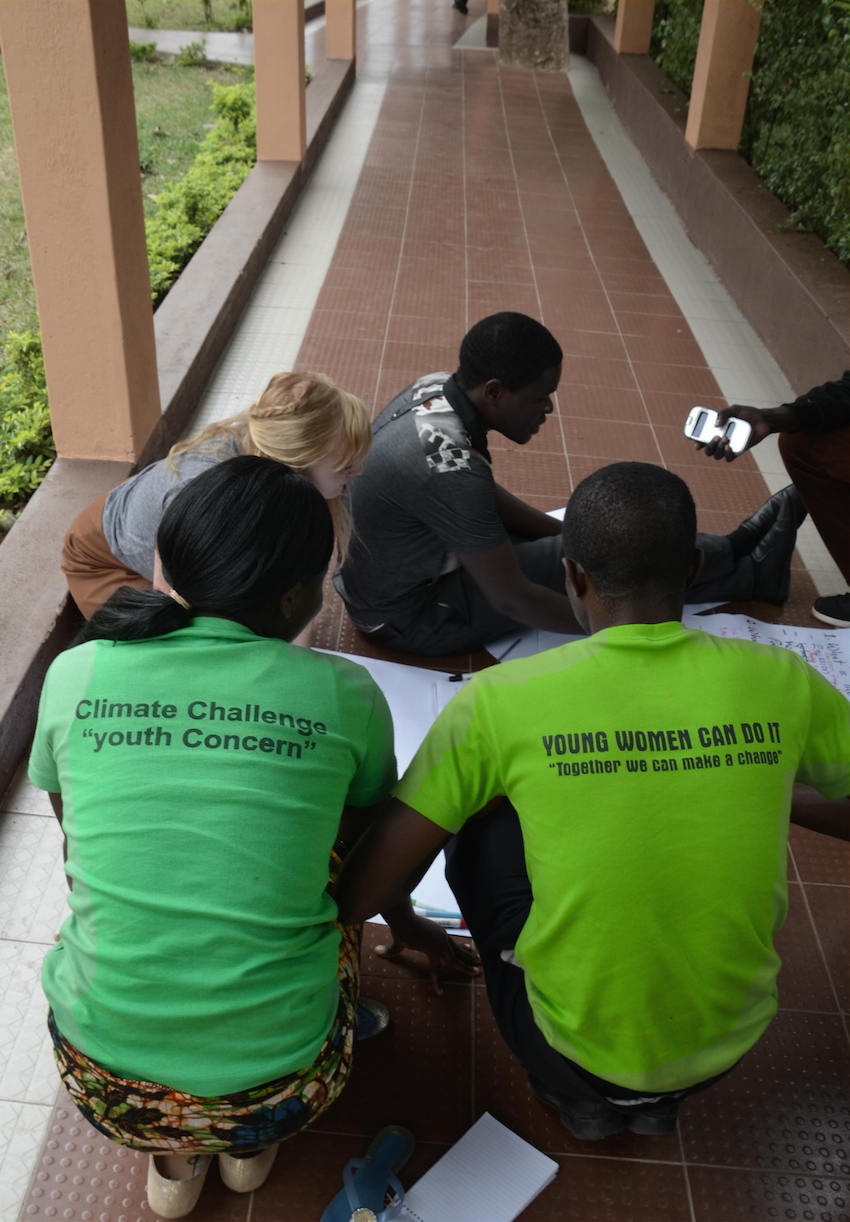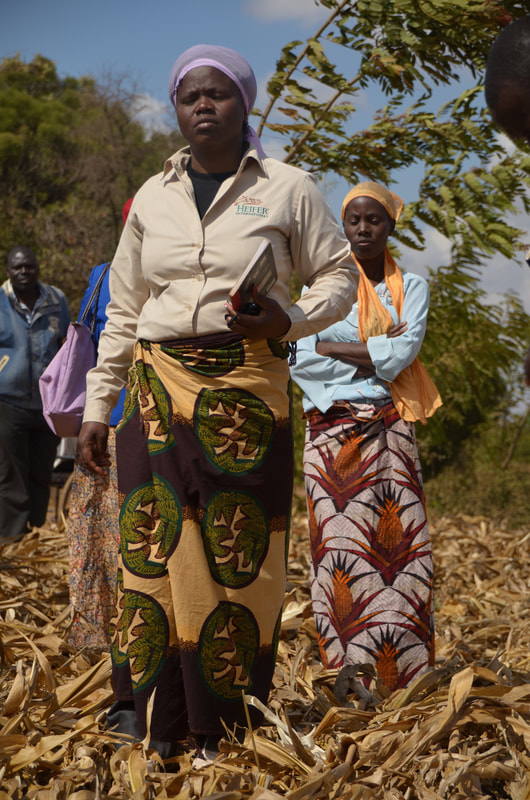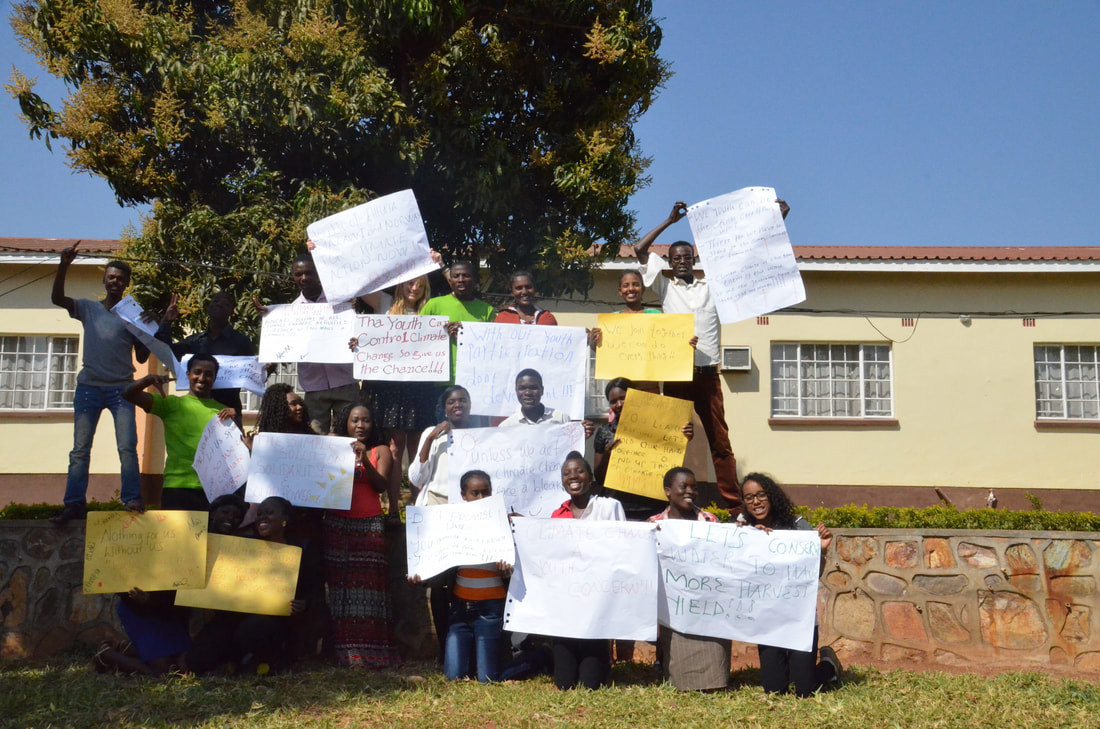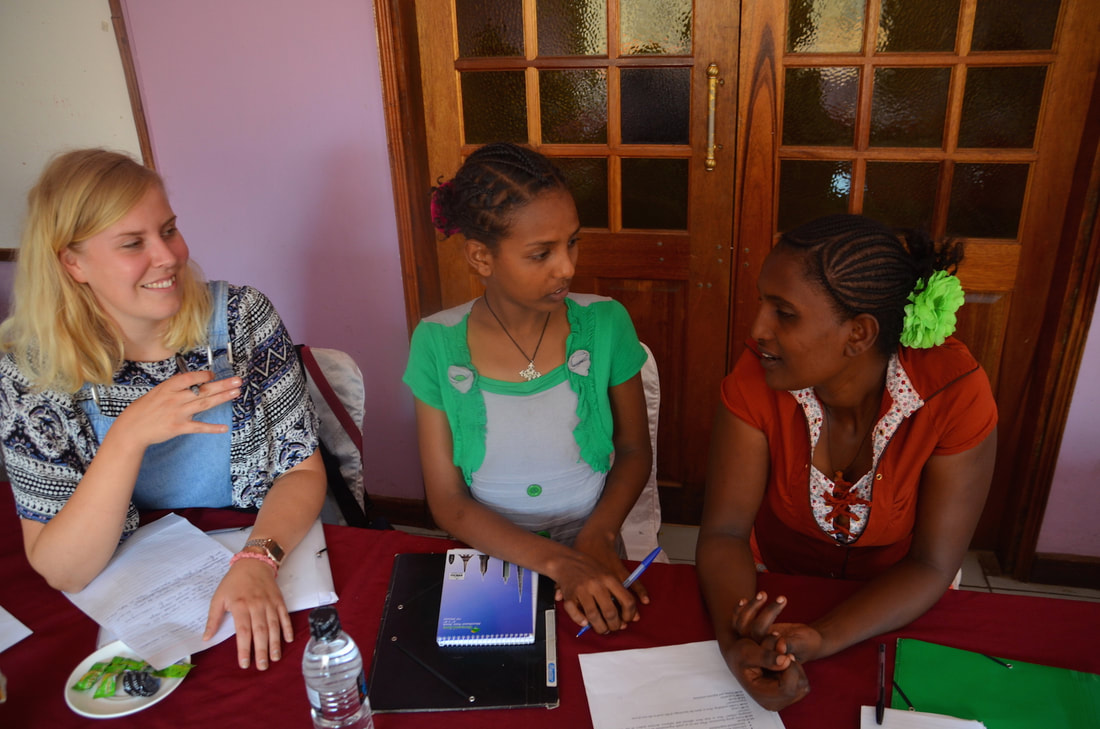|
Over a month has already passed since Spire spent a week in Malawi, as facilitators and participants in the collaborative workshop on Climate Change and Youth Advocacy. The workshop was organized together with our partnerorganizations Network for Youth Development (Malawi) and MELCA Ethiopia. As the representatives for Spire and the International Committee, we (Stina Lindholm and Hanne Krystad) spent five days together with the remaining 22 participants at the Riverside Conference Center. It was an intense, inspiring and memorable week. Looking back, we feel lucky to have met some great people and collaborators, and to have gained lasting new perspectives to the issues of climate change and youth advocacy. Spires approach to climate activism is informed by the perspective that every effort of climate collaboration between developed countries and developing countries should be grounded in processes of mutuality and solidarity. We can and should learn from each other, and we can and should create dynamics of reciprocal exchange when it comes to knowledge and experience. This perspective defined the entire process of planning the workshop program, and it proved to be both attainable and meaningful. Every workshop participant contributed with their personal perceptions of best practices and experiences as social activists in different national and cultural contexts. And for our partners in Malawi and Ethiopia, the struggle is real. Interconnections of gender discourses and economy in Malawi The majority of NfYDs and MELCAs members are of rural backgrounds. Their families depend on farming, and they have witnessed and experienced the effects of climate change in decreasing yields due to unpredictable rainy seasons. And when the national economy is so heavily reliant upon agriculture as it is in Malawi, unpredictable rains and lesser crops entail huge economic consequences for millions of households. Interpreting the personal narratives disclosed by the youths from Malawi and Ethiopia, we see how intersections of climate change and economic instability at times entail cultural and social dimensions. I found myself particularly moved by narratives of the ways in which unpredictable climate and unstable household economies manifest itself along gendered lines. One recurring example that we were told is how small-scale farming households, due to the decreased crops, now has to use the entire yield for consumption, leaving them with nothing to sell. Without surplus cash, the family will not be able to pay for school fees, textbooks and so forth. And as described by the youths during the workshop, young girls are the first to be taken out of school if a family falls on economically hard times, leaving thousands of young female actors illiterate and severely limited as to job opportunities, financial independence and personal autonomy. According to numbers provided by NfYD, only 67% of female actors are literate compared to 77% of males in Malawi today. These numbers are upsetting, and they reflect what some of the workshop participant described as a general devaluation of female actors in Malawi. Women are marginalized in the job market, underrepresented in decision-making processes and -institutions, and have lesser access to secondary and tertiary education. Moreover, in certain parts of the country, the practice of (female) child brides is still in effect. Malawi has one of the highest rates of child marriage in the world, with 1 in 2 girls married by the age of 18. “Child marriage is also closely linked to poverty, as often in rural areas girls will be married off very young to improve a family’s financial status. In northern Malawi, kupimbira, or giving a young daughter in marriage as repayment for a debt, is practiced.”(1) Once a girl is married off, her family will recive dowry (lobola), in the form of cash or other material possesions. Now a wife, the girl usually drops out of school, and again, her agency severely limited. The child marriages is in many ways a financial transaction - an economic strategy for poor families, and the persistence of this cultural practice can be seen in light of recent changes in the regional climate and the national economy. At the same time, Spires partners in Malawi has played a key role in the grassroots activism against child marriages. As of early in 2015, and following advocacy efforts by civil society including NfYD, the parliament adopted the Marriage, Divorce and Family Relations Bill, raising the minimum age of marriage to 18. However, the new provisions cannot overwrite the Constitution, which stipulates that girls and boys ages 15 to 18 may marry with parental consent. The constitution also does not specifically prohibit the marriage of children under 15, but merely directs the government to “discourage” them. Our point here is to stress the fact that Malawian NGOs and civil society has made huge strides when it comes to the rights of women and youths. At the same time, certain cultural and economic structures continues to form barriers against social change. Climate change is not gender neutral In presentations and in our informal conversations with the workshop participants, we were told stories about relatives, village girls and even participants themselves, whom have been taken out of school due to financial limitations – which is again interconnected with the climate change influence upon Malawian agriculture. These challenges are not limited to Malawi or Ethiopia. The United Nations Womens Watch-initative explicitly establish that climate change can be particularly devastating for female actors in the global south. “(...) women are more vulnerable to the effects of climate change than men—primarily as they constitute the majority of the world’s poor and are more dependent for their livelihood on natural resources that are threatened by climate change. (...) when coupled with unequal access to resources and to decision-making processes, limited mobility places women in rural areas in a position where they are disproportionately affected by climate change. It is thus important to identify gender-sensitive strategies to respond to the environmental and humanitarian crises caused by climate change.”(2) In their 2014 report on Food Security in a Climate Perspective, NORAD also recognize the interconnections between gender discourses, climate change and active participation/integration of women in issues related to agriculture and development. The report states that if women had the same access to land, technology, financial services, education and markets as men, agricultural production could be increased and the number of hungry people reduced by 100-150 million.(3) “Women play a key role in agricultural production and household food security, In Africa, women make up the majority of small-scale farmers, and account for 60-80 % of local food production. Women are also the main caretakers of the family, as well as conducting other chores such as collecting firewood and water. The burden of these responsibilities severly limits womens food production and the time for engaging in income-generating activities.”(4) These gendered dimensions of climate change does not go unoticed by Spire, our motherorganization The Development Fund or our collaborators in Malawi and Ethiopia. Several of DFs projects abroad takes on the issues of women, development and climate change. Last year, DF won the annual Operation Days Work, and focused the project and funds towards young girls and their access to education in Malawi and Ethiopia. Members of ODW and our partnerorganisations in Malawi visited each other to learn more about social activism among youths in the different countries. The ODW-campaign proved to be a great way to further strenghten the support towards local projects that empowers women locally, such as the Young Women Can Do It-initative in Malawi. This programme was modeled upon the Norwegian labour movement´s struggle for women´s rights (Kvinner Kan), and was initiated with the support from Spire and DF, and scaled up with support from ODW. YWCDI was well represented during the workshop in Lilongwe, and learning to know their motivations for entering the organization, their forms of activism and educational outreach was no less than inspiring. “I am the one who is supposed to fetch fire wood, water and find food for the family” What we wish to show with this article, is the interconnections between economy, gender discourses, climate change and cultural processes. More often than not, effective change necessitates a multidimensional approach to these complex issues. Climate change is not genderneutral. One of the female workshop participants, more closely introduced in a blog post, expressed it like this: “(to) conserve the environment in the communities (...) motivated me as a young woman in Malawi. Climate change affects me because I am the one who is supposed to fetch fire wood, water and find food for the family. If we don't conserve (...) we might suffer in the future. For example, there might be hunger or drought in the country if we don't conserve the environment.” Cathy (23), YWCDI Nkhata Bay. Her experiences and perspective is echoed by the UNDP´s 2011 Overview of linkages between gender and climate change. “Women in developing countries are particularly vulnerable to climate change because they are highly dependent on local natural resources for their livelihood. Women charged with securing water, food and fuel for cooking and heating face the greatest challenges. Women experience unequal access to resources and decision-making processes, with limited mobility in rural areas. It is thus important to identify gender-sensitive strategies that respond to these crises for women.”(5). The solutions to gender discrimination, poverty and climate change is interlinked – this is a point that is at once overwhelming and inspiring. In the global south, the fight for climate and the fight for womens rights cannot be separated. Our partnerorganizations in Malawi and Ethiopia are taking these connected points of social issues head on in dynamic and creative ways. You can check out this blog post to learn more about their work. Notes: 1 UNICEF, State of the World’s Children, 2015; Human Rights Watch, “I’ve never experienced happiness”: Child marriage in Malawi, 2014 2 52nd session of the Commission on the Status of Women (2008) “Gender perspectives on climate change,” Issues paper for interactive expert panel on Emerging issues, trends and new approaches to issues affecting the situation of women or equality between women and men. 3 NORAD: Food Security in a Climate Perspective // Annual Report 2014, p. 34 4 Ibid. 5 UNDP Asia-Pacific Human Development Report 2011 Tekst: Hanne Krystad
Comments are closed.
|
Photos from Aircaft @ Gloucestershire Airport By James, School Strike 4 Climate, katerha, focusonmore.com, krossbow, edenpictures, ldifranza







